20 Argentine Habits I Lost in India
Next, I will tell you what are those 20 Argentine Habits that I lost in India in order to adapt.
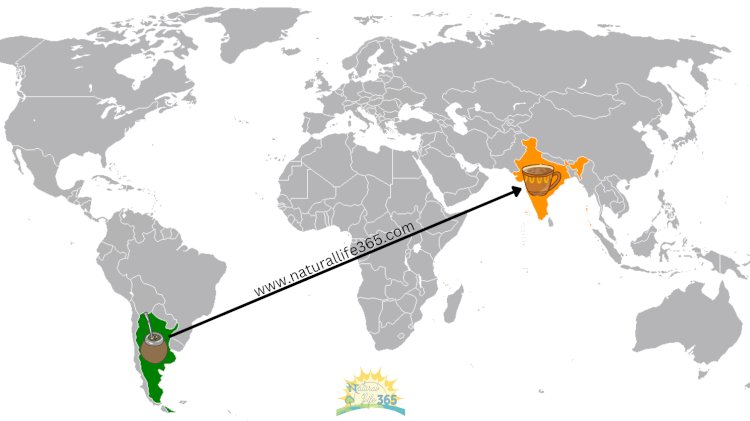
"Each country is a world apart" and "Traveling opens your mind" are two of the most-heard phrases from people who have visited different countries and cultures. But the thing about the traveler is that after a while of exploring, he always returns home to his loved ones, and culture, with new perspectives and learning, perhaps, but in the long run, he always returns to his habits.
For those of us who emigrated, the journey never ends. It is a constant learning and you have to stop doing what you already know, especially if that new country of origin is from an opposite culture to yours. Even if you don't want to change, certain habits perhaps were very common for you but are frowned upon in your new country of residence. That is where one has to adjust for a matter of respect because of the foreigner it’s you.
As Morticia Addams says: “Normal is an illusion; what is normal for a spider is chaos for a fly”. And Morticia is quite right, in Argentina, I had certain habits that, due to social and cultural reasons, were normal but are not in India. And that's where new habits are created, as I said before, it's a matter of respect but it's also because you don't have many options.
Well, come with me to see this sad story… Haha! No, I'm joking! ![]() All the Argentine habits that I lost, I replaced them with others that are better for me (except for number 14 because it's something I miss). Discover what are the 20 Argentine habits that I lost in India.
All the Argentine habits that I lost, I replaced them with others that are better for me (except for number 14 because it's something I miss). Discover what are the 20 Argentine habits that I lost in India.
Lost Habit No. 1: Being afraid of wearing colorful clothes.
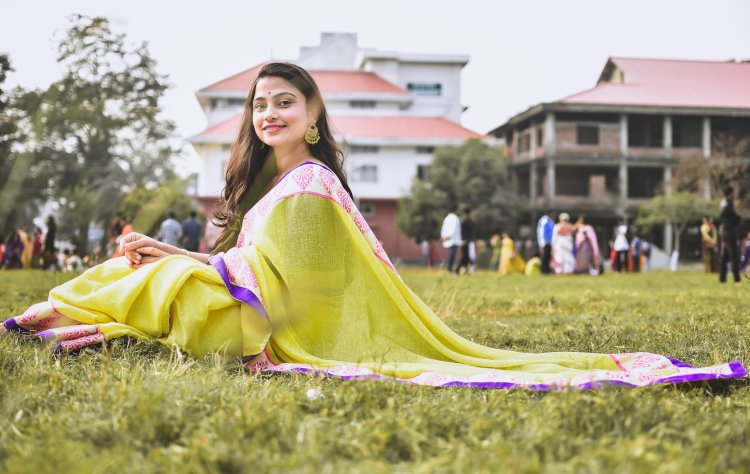
In Argentina, I always dressed in neutral colors like black, it was very rare to see people wear shiny, phosphorescent, or colorful clothes, so I didn't dare to wear them either. But in India (although I still love black), I can wear salwar kameez, kurtis, kurtas or sarees in all colors and with sparkles. It is the most normal thing from day to day and nobody will look at you for it.
Lost Habit No. 2: Being offended by personal and intrusive questions
I remember that in Argentina some people asked me questions like "When will you have a baby?" the truth is that I felt very uncomfortable, although they asked me very occasionally. Since I live in India, this type of question is something of every day, you can receive questions from "How much money do you earn" to "When will you have a baby" regularly. I already take it easy.
Lost Habit No. 3: Sleeping with closed windows
Yes, this is another habit that I have because now if I don't sleep with the windows open, I feel like I'm suffocating, and sometimes I even get a headache. Before night fell and in my house in Argentina we always closed everything and if it was summer, we turned on the fans or the air conditioning.
In India, I sleep with the windows of my room open but of course, it has a mosquito net so in summer mosquitoes or other insects do not enter. I acquired this while living in Kolkata because the vast majority of family homes do it and the first years were a struggle because I closed everything and after a while, everything was open again so now I got used to it, even in winter.
Lost Habit No. 4: The toilet paper
Let's see... this is a topic that, although it is not so pretty, I had to include because when it comes to bathroom issues, there is a difference in culture between India and the West that we all know.
For those who don't know, in Argentina, our houses have a bidet which is a sanitary object made of ceramic that is used for sanitizing after using the toilet. You will see this sanitary object in homes and hotels in South American countries such as Argentina, Uruguay, Paraguay, and southern Brazil. However, despite the existence of the bidet, the toilet paper never went out of use, it was also always there. Let's be honest, during the quarantine, in the West people were fighting to grab the packages of toilet paper in supermarkets without perhaps realizing that the use of soap and water (whether they have a bidet or not) is not only healthy but also economic.
Although in our houses in Argentina, there is a bidet, in public bathrooms, in schools, offices, and at the University there are none, nor is there a bucket with water, a jug, and soap in the bathroom cubicle, but what is there? Toilet paper, so I had no choice. That's why I learned to carry wet sanitary wipes with me to sanitize myself in case I have to use a public bathroom and when I get home, I have an immense need to bathe.
In India, you will not use toilet paper, and believe me, it is the best.
Lost Habit No. 5: Bedsheets = 3 items
The first time I went to buy bedsheets in India, I only looked at the material, the size, and the color. When I got home and opened the package, I found that there was only one bedsheet and two pillow covers (sometimes they bring 3). The first thing I said was "And the other bedsheet?"
In Argentina, the sets of bedsheets consist of a bottom sheet (the one that covers the mattress and has elastics at the ends), a top sheet (it is the sheet with which you cover yourself), and 2 pillow covers. This set is sold indivisibly, so if you make an online purchase, for example, and you don't specify what it consists of, we can always count on it bringing these three elements. The same happens if you buy in a physical store, that's why I assumed that in India it would be the same but no, I was wrong.
In India, I found that what would be the top bedsheet for me, is the sheet that goes to the mattress, and of course, it does not have elastic at the ends. So, I have to use another top bedsheet to cover myself.
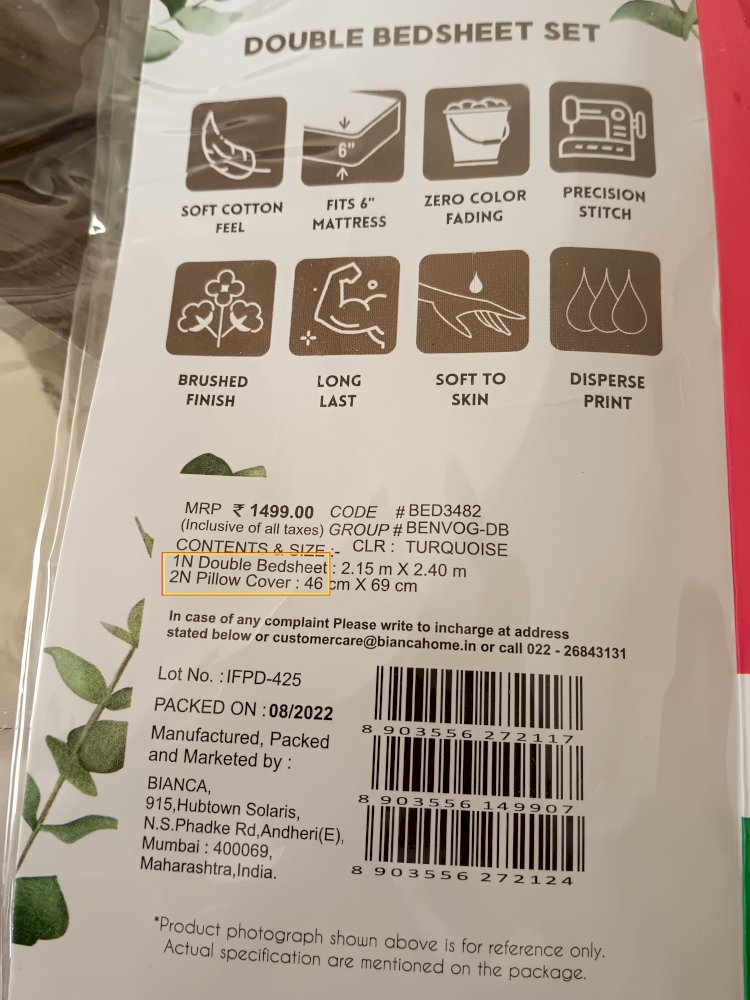
Package specification: 1 double bedsheet + 2 pillow covers.
Lost Habit No. 6: Making incorrect assumptions about India
All of India is different; the language changes from region to region and with it the religion, tradition, and culture. For example, Bollywood movies came to the West but unfortunately, it shows a cultural stereotype that does not apply in India.
By the way, I have a Bollywood blog in case you're interested, I'm sure you'll be surprised.
Lost Habit No.7: Eating with cutlery
At home, when I used to grab (certain) foods with my hands, they would tell me "Don't you have cutlery?" Now eating with cutlery is an unusual thing to do unless you eat pasta or soup. At first, it was hard for me to eat the rice with my hand, but over time, I got better and it is very satisfying.
Lost Habit No. 8: Wait for cars to stop to cross the street
Crossing the streets in India is quite a challenge! But I already understood it. If luckily, there is a traffic light nearby, I wait for it to turn green so I can cross, but if not, cars don't usually stop to let you cross. By observing the locals, I realized that certain practices involve not being afraid, not showing doubt, and showing the palm of your hand to the driver to make him stop if necessary.
Lost Habit No. 9: Feeling suspicious when people stare at me
Since I live in India, no matter where I am, people always stare at me; and even ask to take photos with me (it does not matter if I am in the supermarket). At first, it was a bit awkward, but now when I see someone who looks at me a lot, I say hello! And they smile. I understand that they stare at me out of pure curiosity and I know that this happens to all foreigners who visit the country.
Lost Habit No. 10: Avoid crowding people
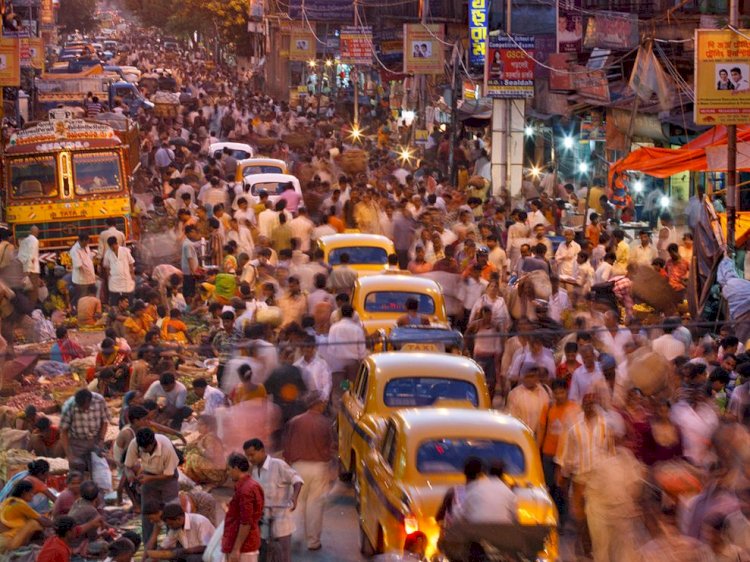
Forget having a personal space in India. I have found myself in incredible crowds of people on the street during Christmas as well, walking on a normal Sunday afternoon. This, at first, caused me problems ranging from headaches to dizziness.
Now it doesn't happen to me anymore, it doesn't bother me to go on a train or bus full of people, you get used to bumping into them all the time.
Lost Habit No. 11: Pay for a fixed price
In Argentina, I never asked a salesman to lower the price of any product, if I could buy it, I would buy it and if not, I would look elsewhere. Also, salesmen never hold you back from bidding if you don't accept their initial price. The custom of bargaining does not exist; all shops have fixed prices (unless you find offers or discounts).
In India, bargaining is very common although it is also true that this does not apply everywhere, for example, you cannot do it in a restaurant. The act of bargain is very present in street markets and although at first, I was embarrassed to do it, I realized that they raised the price a lot when they saw me, so I started bargaining like a local too, although I don't do it with senior vendors.
Lost Habit No. 12: Going out without making plans
I can no longer go out without making plans in case I want to go see tourist places in a city. For that, I have to plan due to the distances and I must take into account the time to use the subway, train, or any other public transport, as well as the closing time of the place I want to visit.
Lost Habit No 13: Foods without garlic or spicy
I always say it, over time, our body can get used to everything. For me, eating garlic and spicy foods was horrible stomach torture and I suffered a lot during the first 2 years of living in India because I was not used to chili, garlic, etc. Luckily, I'm done with that phase or at least I don't get sick anymore.
Lost Habit No. 14: If I don't drink mate I'll die!
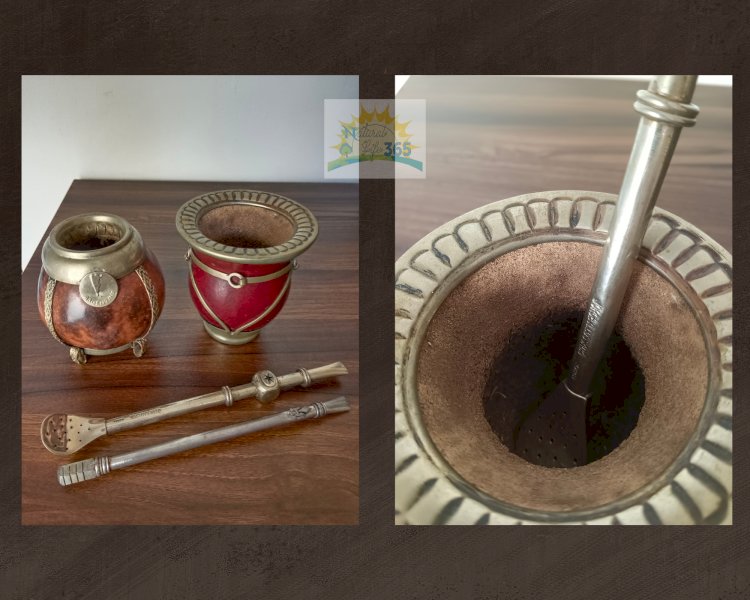
These are my bombillas and mate (porongo). You can find them in different designs and sizes.
For Argentines, mate is a study and work companion, it is sharing your moments with friends, it is like chai in the afternoon for the Indians, the only difference is that we drink it all day (sometimes more than a liter per day).
For those who don't know, mate is a traditional hot infusion from Argentina (you will also find it in Uruguay, Paraguay, and southern Brazil) that consists of using the leaves of the dried mate plant, called yerba mate, which must be placed in a hollow container also called mate or gourd depending on the region, which can be made of dried gourd, metal or wood. Also, you need a “bombilla” which can be translated as “straw” that is made of stainless steel or nickel silver, which serves as a filter, so you can call it a filter straw. Finally, we need hot water (not boiled, hot, 80 degrees) that we put in a thermos with a glass inside to keep the heat longer.
Well, after this brief explanation, my mate was the best in the world, it accompanied me everywhere, and from one day to the next I stopped drinking it. When I came to India for the first time, I brought several packages of yerba mate, then my family sent me but because of the shipping costs (shipping costs more than the package of yerba mate itself), I asked them to stop sending so I was like 5 years without drinking it and it was very hard! I used to feel very sad because I felt that the only thing that made me feel connected to my land was no longer there. Still, I replaced it with green tea and other herbal teas (in a normal cup) to avoid that anxiety that I was missing something but over time, I was feeling better.
All these years I searched in India and couldn't find yerba mate but I'm amazed that I finally saw it on Amazon! And I almost cried! I found an Argentinean brand called Cruz de Malta and although it is more expensive than the others (because they import it), I also found other brands at affordable prices along with the bombilla (bombillas/straw filters are always more expensive, even in Argentina but they last many years). If you don't want to drink mate because you don't have the bombilla and gourd, it doesn't matter, with yerba mate you can also prepare tea in a normal cup.
Don't you know how to prepare a mate with your mate set? Check this video.

And the queen of all: yerba mate! (You also find it with different flavors and thicknesses of dry sticks).
Lost Habit No. 15: Eat barbecue every Sunday
Although I was never a meat lover, I used to consume it at least once a week. In Argentina, it is very common to have barbecues on weekends because it is the way we have to bring the whole family or friends together.
I remember that my friends made jokes when they knew that I was no longer going to be able to eat barbecue in India, it is that Argentines are very carnivorous and the truth is that it did not cost me anything to leave meat aside, I suffered more with my mate!
Lost Habit No. 16: Give a kiss on the cheek as a greeting
In Argentina, we have the custom of greeting each other with a kiss when we see our friends and family (although where I am from, we do it with two kisses), and even goodnight kisses in many of our homes. This greeting is made between men and women, women with women, and depending on the moment, also men with men or with the typical handshake.
When you grow up in a place that has these customs, it is normal for you and sometimes, without meaning to, you take it with you wherever you go without realizing that in that place, it is not correct. And I must confess that at first, I didn't know how to say hello, it looks like a very small and simple thing, right? But for this I also needed time. Another habit is lost so as not to bother others.
Lost Habit No. 17: Wearing high-heeled shoes
I was very used to wearing high heels, I had many pairs of these shoes and I had even brought some of them but the truth is that I could never wear them again. This is because; when I lived in Kolkata, the sidewalks and streets were not suitable for wearing shoes of this style (still can’t do it). Another reason is that I always had to be in a hurry and although I can walk in high heels, I can't run in them.
Long live the sneakers and flat shoes! ![]()
Lost Habit No. 18: Wear shoes inside the house
Let's see, it may sound confusing. Of course, in India we can wear shoes inside our houses, what cannot be done is to be inside a home with the same shoes with which you were on the street.
However, taking off the shoes we wear on the street to enter our houses is not an Argentine custom. Therefore, this is another habit that I acquired in India, now I have shoes to wear only inside my house and other shoes that I only wear to go out.
Lost Habit No. 19: Not washing rice before cooking
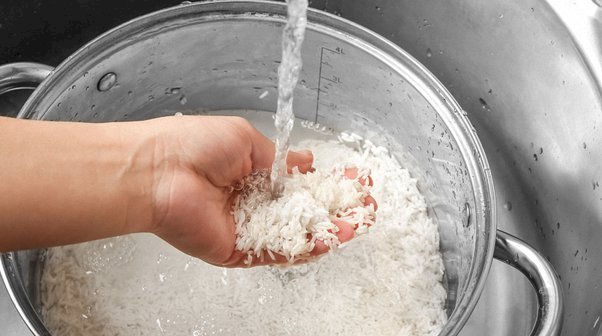
Washing rice before cooking is something I learned in India, but it is also customary in other Asian countries. In Argentina I never did it and now I do it automatically. Now until the water looks clean, I don't cook the rice.
Lost Habit No. 20: Always drink cold water
This has been very difficult for me to change because I was used to drinking cold water even in winter, it was normal for me. And this is related to what I said about spiciness, the body gets used to everything.
Now I drink water at room temperature all year round unless I'm outside in 50-degree heat! There I would accept you some ice water!
And this blog reached its end, now maybe you can know me a bit more ![]()
Are you also an expat? Tell me in the comments section what were those habits you lost living abroad for many years that I will be reading them!
Thanks for stopping by to read! ![]()
You can also read Do Hindus Celebrate Christmas?
If you value these free online resources provided by Natural Life 365, please consider supporting my website by sharing the blogs.
DISCLAIMER:
Some of the links in this content may be affiliate links. This means that if you click on one of the links and make a purchase, I may receive a commission (at no extra charge to you). However, I only recommend products that I personally use and have tested myself. Also, understand that I have taken reasonable steps to ensure that the information on this content is accurate, but I cannot represent that the website(s) mentioned in this post are free from errors. Please, check the Affiliate Disclosure at the bottom of this website.










































